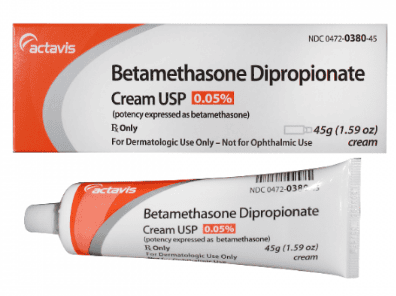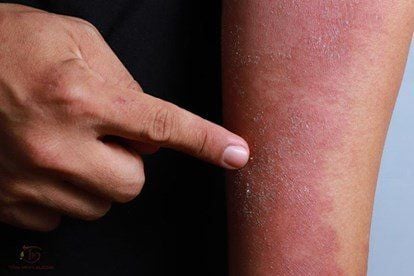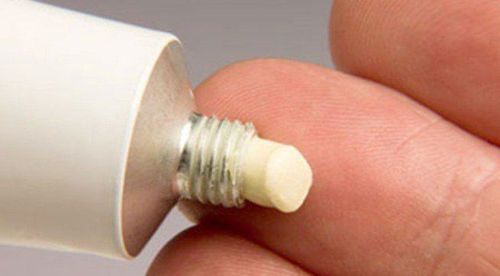This is an automatically translated article.
Atopic dermatitis is a common clinical skin disease that can appear at any age. The disease reduces quality of life due to frequent recurrences and greatly affects the patient's aesthetic and psychological well-being. The cause of the disease has not been studied and understood in detail.
1. Causes of atopic dermatitis
Currently, the cause of atopic dermatitis is still not well studied. However, in the opinion of many experts, the clinical occurrence of atopic dermatitis is the result of the interaction between many factors, including atopic or hereditary atopic dermatitis. a decrease in the immune barrier that protects the body and the surrounding environment.
Several risk factors that increase the risk of the disease and are related to the severity of the disease have been shown, such as: Having a close family member with atopic dermatitis (hereditary atopic dermatitis). History of allergies to drugs, chemicals, food or pollen, dust, house mites, and insects. Having a medical condition related to atopic dermatitis such as allergic rhinitis, atopic dermatitis, bronchial asthma, psoriasis.
Several studies have shown that passive and active smoking increases the incidence of atopic dermatitis in adults. The environment is polluted, a lot of dust. The weather changes seasons, especially in the cold and dry winter. Stressful lifestyle and psychological stress. Infections or acute illnesses that weaken the immune system.
Patients need to distinguish between the cause of the disease and the risk factors of the disease. The risk factor is not a direct cause of atopic dermatitis, but only makes the disease more likely to occur with exacerbations and prolonged progression or recurrence of atopic dermatitis in the future.
2. Is atopic dermatitis contagious?
Atopic dermatitis is characterized by raised and superficial lesions on the skin surface. The great concern of patients and caregivers is often related to the question of whether atopic dermatitis is contagious. Unlike many other skin conditions, atopic dermatitis is not contagious. This means that direct contact with fluid from blisters or secretions or blood from a scratch or abrasion on the skin does not increase the risk of infection.
However, atopic dermatitis is hereditary. Many clinical cases recorded atopic dermatitis inherited from parents to offspring. When both parents have atopic dermatitis at the same time, more than 80% of cases will be born with the disease. This rate drops to about 50% if only one parent has the disease. Hereditary atopic dermatitis is also shown through an increased incidence when other family members have the disease. Therefore, parents should be careful in how to take care of their children's skin and take them to a dermatologist for advice and appropriate treatment.

Bệnh viêm da cơ địa không có tính lây lan
3. Clinical symptoms of atopic dermatitis
Atopic dermatitis can appear at any age, most commonly in children younger than 2 years old. Typical clinical manifestations of atopic dermatitis in children are small blisters on a red background scattered or concentrated in plaques, concentrated on the face, around the cheeks, forehead and nasolabial folds. . This vesicular lesion is often very itchy, causing the child to scratch, scratch, bleed and increase the risk of superinfection, thickening of the skin and making it difficult to treat. Contact with clear secretions from vesicles does not increase the caregiver's likelihood of infection, but once superinfection has occurred, the lesions are more likely to spread to other areas of the body.
In addition to the symptoms of blisters and itching, atopic dermatitis patients may also face dry, cracked skin and spontaneous bleeding. Different from children, adults with atopic dermatitis typically appear lichenified thick patches of skin in natural folds in the body such as elbows, popliteals and neck area. This lesion appears to signal that the disease has entered the chronic stage and is more difficult to respond to treatment.
Diagnosis of atopic dermatitis usually only needs to be based on the above clinical symptoms. Quantitative testing of IgE in the blood allows to suggest the presence of an allergic condition. Allergen identification and desensitization treatments are more sophisticated steps, usually performed only at large centers.
4. Measures to treat atopic dermatitis
Currently there is no specific treatment for atopic dermatitis. Principles of disease treatment include: Combination of topical treatment with topical drugs and systemic drugs. Change the treatment plan flexibly, suitable for each stage of the disease. Planning helps to reduce the frequency of atopic dermatitis recurrences. Simultaneous treatment of other diseases related to local factors.
The most commonly used topical drugs are corticosteroids and drugs that ensure skin moisture. Corticosteroids can be used topically or systemic. Drugs have many side effects, so patients absolutely do not buy drugs to use or change the dose and duration of medication without consulting the doctor.

Người bệnh khi điều trị bệnh viêm da cơ địa cần tuân thủ theo đúng y lệnh của bác sĩ
5. Prevention of recurrence of atopic dermatitis
Although atopic dermatitis is not contagious, it often recurs, negatively affecting the patient's quality of life. Some measures to help reduce the possibility of disease recurrence include:
Compliance with treatment and consultation of dermatologists. Maintain skin hygiene, do not use products with strong detergents. Cut your child's fingernails to avoid scratching and bleeding skin lesions. Use skin moisturizing products, maintain skin moisture enough because when dry, the skin becomes more vulnerable. Use thin clothing made from soft materials that do not irritate the skin. Keep the living environment clean, limit dust. Remember to wear clothes that are warm enough to keep your face warm, especially during the changing seasons. Do not shower with very hot water in the cold season because it dehydrates the skin and makes it dry. Avoid foods or products that you know you are allergic to. Limit the use of many new cosmetic chemicals, which do not guarantee the origin and quality. At Vinmec International General Hospital, there is a package of examination and advice on treatment of atopic dermatitis to help customers assess their general condition and advise on measures to prevent recurrence.
When registering for a package of examination and consultation for treatment of atopic dermatitis, customers will receive: Dermatology specialist examination. Perform tests such as: quantitative IgE, fresh mycobacteria, specific IgE quantification with respiratory allergens - food (Panel 1 Viet), test Rida Allergy Screen (panel 1)...
To be examined and treated with leading Dermatologists in Vinmec, you can contact HERE.
SEE ALSO:
Package of examination and advice on treatment of atopic dermatitis Atopic dermatitis: What you need to know Children with atopic dermatitis: How to take care of it properly?













